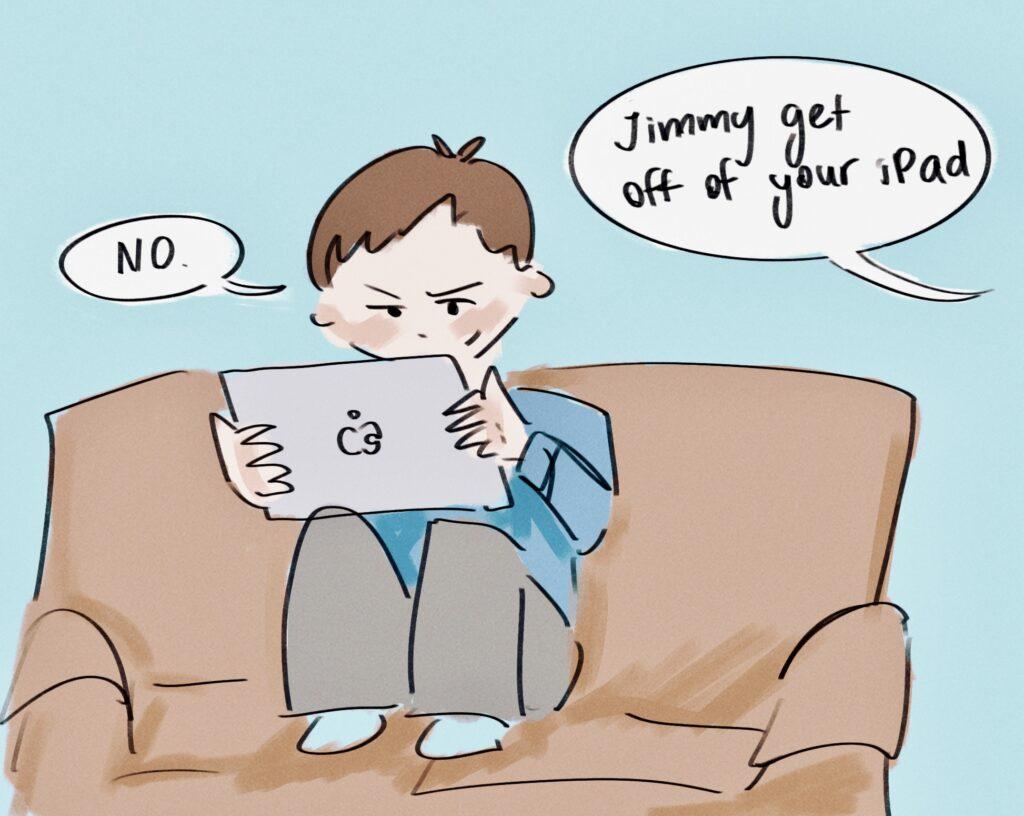It seems that everywhere we go — restaurants, streets and playgrounds — there always seems to be a kid entranced by their iPad, hopelessly unaware of what’s going on around them.
This is part of a new generation of “iPad kids,” a boom in children hooked to their tablets as a result of the increasing integration of technology into our daily lives at ever younger ages, further exacerbated by the device-reliance caused by the pandemic.
According to the U.S. Census Bureau, 80% of households with children owned a tablet in 2021, compared to only 60% of households without children. Even for children at the preschool level, 24% of their parents had bought them tablets.
Beginning with the pandemic, screen time for children under 18 has increased by over 52%, from 2.7 hours to 4.1 hours a day. Given the addictive nature of social media apps — including YouTube, TikTok and Instagram — many children have gone down a spiral of iPad addiction.
People casually throw around the phrase “iPad kid” to refer to their siblings or children, pointing out how they’re always on their tablets. Yet, using this phrase as a humorous characterization fails to recognize the real dangers.
With the increase in iPad usage only imposing damage on children, parents must begin to take action and stop letting electronics take care of their child.
The harms of screen time addiction among children can already be seen. A 2023 study found that kids who had more than four hours of screen time compared to those you didn’t were five times more likely to have stunted communication skills, twice as likely to have stunted personal and social skills and twice as likely to have stunted fine motor skills.
This lack of communication skills extends even further as children addicted to their screens often become short tempered, growing a self-centered ego as if everything has to go their way every time.
A study by the University of Washington found that 93% of parents reported that their child, ages 1 to 5, “throws a tantrum, whines or resists ending screen time,” and 37% said enforcing screen time limit “almost always ends in a fight.”
Even worse, the harmful effects of device use from early childhood can extend to children’s teenage and adult years. A study by Yale University concluded that youth who spent more time on digital technology were more likely to exhibit higher levels of internalizing problems two years later, including depression, anxiety and social anxiety. The study also showed links between screen time and complaints about physical symptoms.
Currently, 95% of teenagers use smartphones, with over 45% reporting near-constant use. With more kids getting hooked on iPads, the future of teenagers’ screen time addiction and mental health looks rather despondent.
This begs the question: If iPads are so harmful, why are so many children getting access to them? The answer stems from parents, who have voiced that iPads are an easy way to keep their kids engaged, since a quick distraction for their children can alleviate stress in potentially difficult situations.
However, parents should recognize that introducing screen time to their children at an early age has many negative effects — a way to calm kids down may turn into a cycle of addiction that impacts their development and later life.
Providing a child with unlimited access to the internet can in no way be an adequate substitute for real parenting, especially with such young children. A child’s development needs the care and attention — and face-to-face engagement — that only a parent or guardian can provide.
Parents should introduce screen time controls and educate their kids about the harms of screen time or simply not buy an iPad for their children at all.
Better still, parents should focus on forming bonds with their child at a young age, as parent-child interaction is key for the child to develop into a happy, resilient individual. They can play board games, go to a park or spend other quality time with their kids.
Here is a plea to parents: Think long and hard before bringing a tablet into your home. A simple distraction may seem desirable at first, but there are much better things to do with your kids that don’t involve an iPad.





























